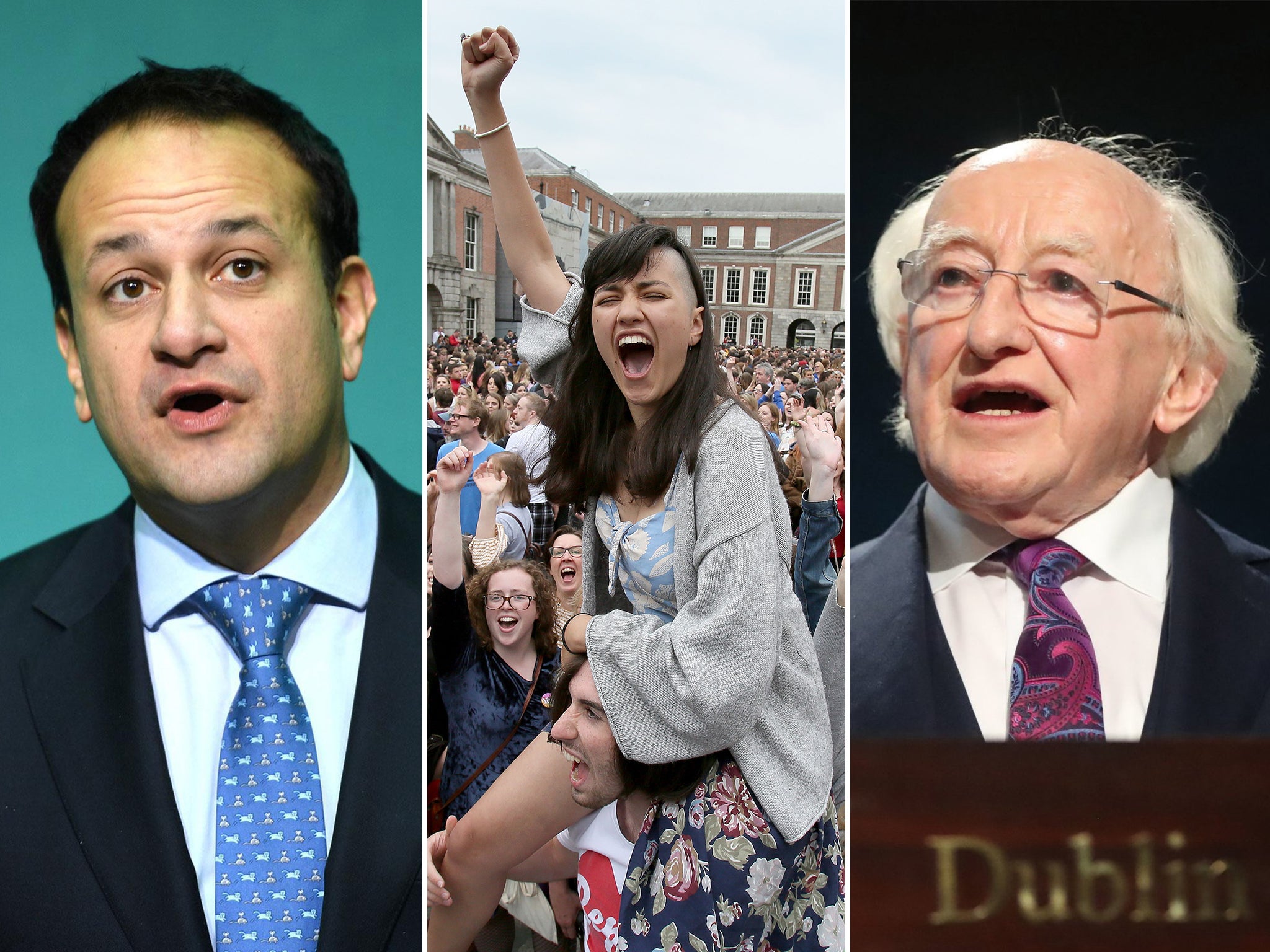2018 in Irish politics: From battling Brexit to repealing the eighth
The past 12 months saw Taoiseach Leo Varadkar fight Ireland’s side in Brexit negotiations as the electorate voted for abortion reform and a second term for President Higgins. Ben Kelly looks back at it all


From the debate and drama of the abortion referendum to the intrigue and fatigue of Brexit, 2018 was a year in which the politics of Ireland seeped out into the wider news agenda of the UK and beyond.
That the Irish border would be the greatest pickle in the wider Brexit conundrum was apparent from the start of the year, with EU negotiator Michel Barnier warning in February that the UK leaving the customs union and the single market would make checks on the island of Ireland “inevitable”.
This issue remains unresolved, despite having dominated negotiations across the year. All the while, Ireland has been tackling its own domestic issues.

Stormont
In February, almost a year after power sharing collapsed in Northern Ireland, a deal between Sinn Féin and the DUP was almost struck. By all accounts, it had been agreed by negotiators from both parties, but with both Theresa May and Leo Varadkar in town to push it over the line, the DUP got cold feet, and pulled the plug.
The DUP later denied the deal that had been leaked had been a final draft, but a more plausible narrative implies that they got cold feet once details around a contentious Irish language act sparked fury among their base. Sinn Féin later released documents claiming to prove that the DUP had reneged on the deal.
Thus, there was a bitter irony in April when, celebrating the 20th anniversary of the Good Friday Agreement, Northern Ireland was without the power sharing executive that had been so painstakingly forged in 1998.
While this situation may have slipped off the news agenda in favour of the more dominant Brexit stories, the public in Northern Ireland are only growing more disgruntled with their politicians and their lack of government, with dwindling budgets and a failure to legislate on even the most minor of issues.
Still, it’s not clear that this would lead them to pull support from Sinn Féin and the DUP at any future election. Neither is there any sign that secretary of state Karen Bradley is any closer to solving the impasse. After all, she did admit this year that she’s learning the basics about Northern Ireland on the job.
Repealing the Eighth
South of the border, the referendum on the Eighth Amendment dominated politics for the first half of the year. On 25 May, voters were asked if they wanted to repeal an article of the constitution that effectively banned abortion.
Having been pushed by a grassroots movement over recent years, most of the Irish political establishment supported repeal. But the campaign, which dealt with such an emotive and divisive subject, was considerably more gruelling than the vote on marriage equality in 2015.
In the end, the landslide vote came as a surprise, with 66 per cent of people backing repeal, in what the taoiseach called “the day Ireland stepped out from under the last of our shadows”.
I covered the vote all weekend in Dublin, and spoke with many women about what it meant to them. “For me, it’s the beginning of reparations in Ireland,” one young girl told me outside the count centre. “We’re repairing our relationship with women so we can have a better Ireland.”
But the issue didn’t end in May, with legislation only making its way successfully through the Irish parliament in mid-December. Abortion services will now be made available to women from the new year.

Health and housing
Women’s health was also at the fore of one of Ireland’s biggest domestic stories of the year – the cervical cancer scandal. In April, it emerged that the health service had given out inaccurate smear test results, which had wrongly given the all-clear to women whose results had shown up abnormalities.
It was found that some 200 women would have benefited from earlier treatment, and by the time the scandal emerged, several women were battling terminal cancer or had died.
One woman affected, Vicky Phelan, settled a case against the US laboratory that handled the tests for £2.2m, and she has since been a vocal campaigner for the wider cause.
The other big domestic issue, which has only spiralled across 2018, is the housing crisis. Homelessness has been an increasing problem in Dublin in recent years, affecting families who fall behind on their rent or who can’t access social housing, as well as single people.
With emergency accommodation stretched, one incident in August drew much media attention when photographs of a woman and six of her children being forced to sleep in a police station overnight went viral.
In recent months, huge rallies have been taking place in Dublin and elsewhere in the country over homelessness, evictions and a lack of affordable housing.
With statistics showing nearly 10,000 people recorded as homeless across the country, and with nearly 4,000 children facing Christmas in emergency accommodation, this is an issue that the government has yet to prove it can tackle effectively.
Presidents and popes
In early autumn, Ireland went through the motions of a presidential election, which saw Michael D Higgins returned for a second term as head of state. A formidable incumbent, he was nevertheless challenged by a range of other politicians and businessmen, each more feckless than the last.
Voters went to the polls on 26 October and with 56 per cent of the vote, the man they call Miggeldy was home safe. In his acceptance speech, the president said, “The people have made a choice as to which version of Ireland they want reflected at home and abroad. It is the making of hope they wish to share rather than the experience of any exploitation of division or fear.”
He was contrasting Irish liberalism with the growing far right across Europe and the US, but he was also reflecting on a threat closer to home – the runner-up Peter Casey, who took a fifth of the vote after a campaign that many saw as a test drive for populism.
On the same day, Ireland also voted to remove blasphemy as an offence in the constitution. As with abortion, and marriage equality before that, two-thirds of the country supported the reform, in what can be seen as a growing separation of church and state.
This theme was also evident in August during the visit of Pope Francis, when the numbers who turned out to see the Catholic leader fell far below what was expected. During the visit, the Pope was also challenged on the legacy of clerical abuse in Ireland, for which he apologised.
However, the Pope was evidently more welcome than Donald Trump, whose visit to Ireland in November was cancelled after it became clear he would face widespread protests and (inevitably) the Trump baby balloon.

State of the parties
If Ireland has been making liberal choices around its constitution and the presidency, it is noticeable that parliamentary politics have remained largely the same.
Taoiseach Leo Varadkar enjoys relative approval, as he portrays a strong front for Ireland in the Brexit negotiations. The tough situation in which Theresa May and most British politicians currently find themselves is largely down to his insistence on the backstop, which has support across all parties, as well as from nationalists in the north.
But polls continue to show Varadkar’s Fine Gael party with support levels around 30 per cent, with Fianna Fáil slightly behind on around 27 per cent, and Sinn Féin usually peaking around the 20 per cent mark. These figures have largely gone unchanged across 2018.
The Fine Gael government regularly comes in for some criticism, either for being “posh boys” out of touch with the crises in housing and health, or for the taoiseach’s apparent fixation on good publicity.
By propping up Fine Gael in a confidence and supply arrangement, Fianna Fáil are stuck supporting a party whose policies they claim to oppose, because both parties know an election would not deliver a majority to either.
After being led by Gerry Adams for 35 years, Sinn Féin refreshed its image this year with new leader Mary Lou McDonald. But any bounce her leadership may have initially brought – particularly through her vocal support for repealing the Eighth – has largely levelled off.
Sinn Féin are the de facto opposition, and it is largely through an unwillingness to take them as coalition partners that the other two parties have entered into their unusual marriage of convenience.

What’s another year?
As Brexit looms large in the coming months, and shows little sign of being resolved any time after that, Ireland is preparing. Along with the EU, they are putting their plans for a no-deal Brexit into action, and are focused on steadying the ship, despite the ripples of chaos coming at them from across the Irish Sea.
In recent weeks, Fianna Fáil announced that they would continue to keep Fine Gael in office for another year, because of the uncertainties posed by Brexit. Their leader Michael Martin said, “The chaos will not spread here from London … The national interest will come first.” This means an election will not now happen until at least 2020.
Political parties putting aside their differences to safely guide the country through a time of national crisis? What a thought.
Join our commenting forum
Join thought-provoking conversations, follow other Independent readers and see their replies
Comments
Bookmark popover
Removed from bookmarks